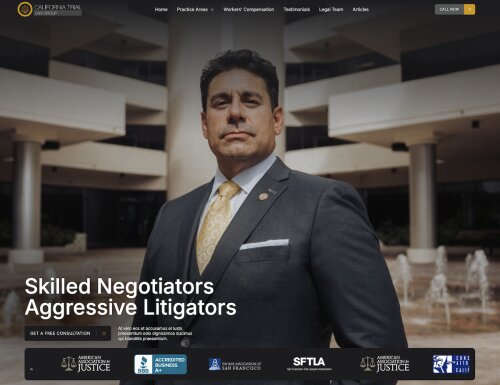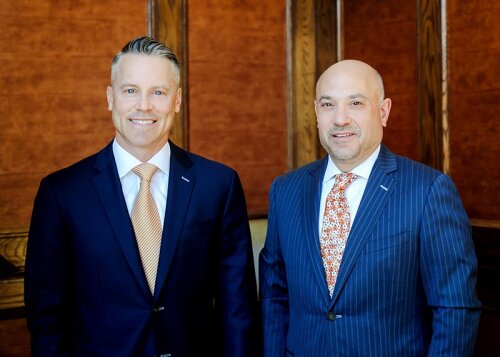Best Wrongful Death Lawyers in Albany
Share your needs with us, get contacted by law firms.
Free. Takes 2 min.
List of the best lawyers in Albany, United States
1. About Wrongful Death Law in Albany, United States
Wrongful death law provides a civil avenue for certain family members to seek compensation when a loved one dies due to another party’s fault or negligence. In Albany, New York, these claims are governed by state statutes rather than local ordinances. The core concept is to compensate survivors for monetary and non monetary losses caused by the death.
There are two related pathways in New York law: a wrongful death action brought by eligible beneficiaries and a separate survival action that seeks to recover the decedent’s damages had they survived. The wrongful death action focuses on the losses suffered by the survivors, while the survival action addresses the decedent’s own harms, such as medical expenses and pain and suffering incurred before death. In Albany, both paths can be pursued depending on the facts of the case.
Damages in wrongful death cases typically include funeral and burial costs, loss of financial support, loss of services, and compensation for the survivors’ sorrow and companionship. The survival action can recover medical and related expenses, as well as the decedent’s lost earnings up to the date of death. Each claim requires careful factual analysis to determine liable parties and appropriate damages.
Wrongful death actions are intended to protect the financial and emotional interests of the decedent’s family while ensuring accountability for preventable deaths.Source: Estates, Powers and Trusts Law (EPTL) and Civil Practice Law and Rules (CPLR) - New York State Legislature
For Albany residents, the process begins with identifying all possible defendants, including individuals, corporations, or government entities, and assessing whether a wrongful death or survival claim exists. Consulting a qualified attorney early helps preserve deadlines and gather essential evidence such as accident reports, medical records, and witness statements.
2. Why You May Need a Lawyer
In Albany, wrongful death cases can present complex issues that benefit from professional legal guidance. Here are concrete scenarios where a lawyer is typically essential.
- Car or truck crashes on I-90 or local roads in Albany that involve multiple liable parties, including other drivers and potentially municipal departments for road maintenance.
- A fatal crash caused by a defective product or vehicle part processed through a manufacturer or distributor with complex liability questions.
- A fatal medical error at a hospital or clinic in Albany where multiple providers contributed to harm and there are questions about medical causation and billing records.
- A workplace accident in Albany where an employer or contractor shared liability with third party vendors, raising issues about workers rights and insurance obligations.
- A fatal incident involving a government entity, such as a municipal vehicle or public safety operation, triggering notice of claim requirements and specialized procedural steps.
- A family member has died after alleged negligent maintenance by a property owner or landowner, raising premises liability concerns and potential comparative fault issues.
In these scenarios, a local wrongful death attorney can help evaluate eligibility, identify all responsible parties, preserve deadlines, and coordinate evidence collection with medical and accident reconstruction experts. They can also guide you through settlement negotiations and, if needed, a trial strategy tailored to Albany courts.
3. Local Laws Overview
Key Statutes Governing Wrongful Death in New York
In New York, wrongful death claims are governed primarily by two bodies of law: the Estates, Powers and Trusts Law (EPTL) and the Civil Practice Law and Rules (CPLR). These statutes establish who may sue, who may recover, and how damages are calculated. They also provide the framework for filing deadlines and procedural steps.
EPTL governs the rights of beneficiaries and the survival aspects of the claim, including who may participate in a wrongful death action. CPLR governs the procedural mechanics, including filing deadlines, service of process, and appeal procedures. Together, these laws shape how wrongful death cases proceed in Albany and statewide.
The General Municipal Law and related provisions also affect cases involving Albany city, county, or public authorities. Public entity claims have special requirements and deadlines, described below under municipal claims considerations.
For references and text of these laws, consult the official state resources. They provide the statutory language and any amendments as they occur.
Municipal Claims and Special Procedures
If a wrongful death case involves a municipal defendant such as Albany City or Albany County, special procedures apply. A key requirement is the Notice of Claim, which must be filed promptly with the municipality. Failure to comply can bar the claim against the public entity-even if the case otherwise has merit.
General Municipal Law establishes the notice of claim rules and related deadlines. These provisions require careful timing and documentation to protect your rights in Albany. Always confirm deadlines with a local attorney when a government entity is involved.
In addition to notice requirements, municipal actions may have unique tolling and procedural considerations. An attorney can help ensure that the claim complies with all municipal rules and that the case remains on track for potential recovery.
Effective Dates and Recent Changes
New York wrongful death and survival action statutes have not undergone sweeping recent changes. The core framework continues to rely on EPTL and CPLR for substantive rights and deadlines. General Municipal Law provisions that govern notices against public entities remain in effect and are relevant in Albany municipal claims.
Keep in mind that case law continues to interpret these statutes, so decisions by New York appellate courts can affect how damages are assessed and how timelines are applied in specific circumstances. If your situation involves complex issues or unusual facts, a local attorney with Albany experience can provide the most current guidance.
For official text and updates, refer to these sources:
- New York State Legislature - Official site for EPTL and CPLR
- New York Courts - Civil and wrongful death resources
- New York State Attorney General - Public resources and consumer protection
4. Frequently Asked Questions
What is a wrongful death claim in New York?
A wrongful death claim seeks compensation for family members when a loved one dies due to another party’s fault. It is distinct from a survival action which addresses damages the decedent could have recovered if they had lived.
How do I start a wrongful death lawsuit in Albany?
Begin by consulting a qualified Albany wrongful death attorney. They will gather evidence, identify defendants, and determine whether to file a wrongful death or survival action. They will guide you through filing in the appropriate court and managing deadlines.
When does the statute of limitations start for wrongful death?
The typical deadline is two years from the date of death for a wrongful death action in New York. There are exceptions for municipal defendants, which involve a 90-day notice of claim requirement and other filing timelines.
Where do I file a wrongful death case in Albany?
Most cases are filed in the New York State Supreme Court in the county where the death occurred or where the defendant resides. Municipal claims may be filed with the local city or county government before pursuing the court case.
Why is a survival action separate from wrongful death?
The wrongful death action addresses the survivors' losses, while the survival action seeks the decedent’s own damages incurred before death, such as medical bills. Both can be pursued if facts support them.
Can a government entity be sued for wrongful death in Albany?
Yes, but you must comply with General Municipal Law requirements, including a timely Notice of Claim. Failure to meet these deadlines can bar the claim against the municipality.
Should I hire a local Albany wrongful death attorney?
Yes. A local attorney will understand Albany courthouses, judges, and local experts. They can focus on deadlines, local practice standards, and evidence collection specific to the area.
Do I need probate or a will to pursue wrongful death?
Probate or administration of the estate is often necessary to pursue a survival action or to manage the decedent’s assets. An attorney can advise on whether probate is required in your case.
Is there a difference between punitive damages and compensatory damages in wrongful death cases?
Wrongful death and survival actions generally seek compensatory damages for loss and harm. Punitive damages are rarely available in wrongful death claims and depend on specific facts and state law.
How much can I recover in a wrongful death case in New York?
Damages vary widely based on the facts, including lost earnings, medical expenses, funeral costs, and the survivors' losses. An experienced attorney can help estimate potential damages based on evidence in your case.
What are the costs of hiring a wrongful death attorney in Albany?
Many wrongful death attorneys work on a contingent fee basis, where fees are paid from a portion of any recovery. You should discuss fee structure, costs, and expenses during the initial consultation.
Do I have to wait until a settlement or trial to recover funds for funeral costs?
Funeral costs and immediate expenses may be addressed in settlement discussions or court orders. Your attorney can help prioritize urgent needs while pursuing the full claim.
5. Additional Resources
- New York Courts - Official site with information on civil actions, forms, and procedural guidance for wrongful death claims. https://nycourts.gov
- New York State Legislature - Texts and amendments for Estates, Powers and Trusts Law (EPTL) and Civil Practice Law and Rules (CPLR). https://www.legis.ny.gov
- New York State Attorney General - Official information on state resources and guidance related to civil actions and consumer protection. https://ag.ny.gov
6. Next Steps
- Gather basic information about the death: date, location, cause, police reports, medical records, and any insurance details. Do this within 1-2 weeks.
- Identify potential defendants: individuals, companies, and municipal entities involved. Create a contact list and gather related documents.
- Consult a local Albany wrongful death attorney for a free evaluation. Schedule the consultation within 2-3 weeks.
- Determine eligibility and deadlines with your attorney. Confirm whether a Notice of Claim is required for any municipal defendants.
- Begin evidence collection and expert consultation: accident reconstruction, medical experts, financial specialists. Plan this within 1-2 months.
- Decide on the case path: wrongful death, survival action, or both. Your attorney will advise on strategy and potential settlement.
- File the appropriate claims and pursue pre trial settlement discussions. Expect a timeline of several months to a few years depending on the case complexity and defendant cooperation.
Lawzana helps you find the best lawyers and law firms in Albany through a curated and pre-screened list of qualified legal professionals. Our platform offers rankings and detailed profiles of attorneys and law firms, allowing you to compare based on practice areas, including Wrongful Death, experience, and client feedback.
Each profile includes a description of the firm's areas of practice, client reviews, team members and partners, year of establishment, spoken languages, office locations, contact information, social media presence, and any published articles or resources. Most firms on our platform speak English and are experienced in both local and international legal matters.
Get a quote from top-rated law firms in Albany, United States — quickly, securely, and without unnecessary hassle.
Disclaimer:
The information provided on this page is for general informational purposes only and does not constitute legal advice. While we strive to ensure the accuracy and relevance of the content, legal information may change over time, and interpretations of the law can vary. You should always consult with a qualified legal professional for advice specific to your situation.
We disclaim all liability for actions taken or not taken based on the content of this page. If you believe any information is incorrect or outdated, please contact us, and we will review and update it where appropriate.









